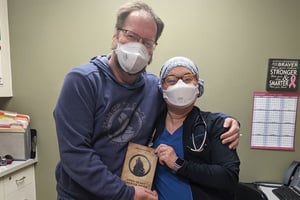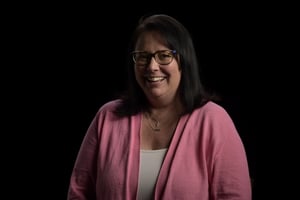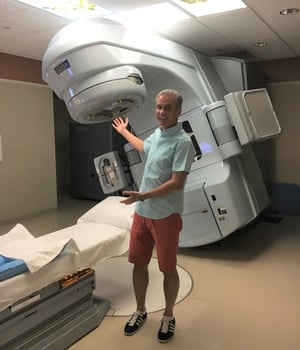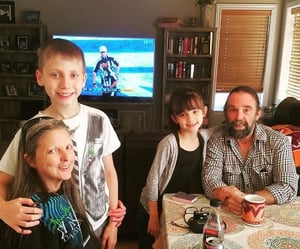What Happens After a Colorectal Cancer Diagnosis?
It's normal to have a lot of questions in those first few days and weeks after a colorectal cancer diagnosis. The Rocky Mountain Cancer Centers team is here to help you prepare for your first medical oncology appointment.

Choosing Your Colorectal Cancer Care Team
To help make treatment decisions about your colorectal cancer, it’s helpful to first consult with a medical oncologist. As a patient of Rocky Mountain Cancer Centers, you will have access to our colorectal cancer specialists at any of our locations across Colorado, including Boulder, Colorado Springs, and Denver.
While surgery may seem like the logical first step, some cases can benefit from a different approach. Visiting with the medical oncologist first will help determine the best treatment for your particular situation.
Who is Part of the Colorectal Cancer Care Team?
Find OutColorectal Cancer Treatments
Non-Surgical Treatments
Surgery for Colorectal Cancer
The right surgery for each patient varies based on the stage of cancer. Learn more about the various colorectal cancer surgeries.
Can I Wait to Make Decisions About My Treatment?
It's important to make good, informed decisions without delay. However, you shouldn't act so fast that you miss opportunities to listen to your doctor's recommended cancer treatment plan and address any questions or concerns that you may have. Your first step is to schedule an appointment with a gastrointestinal or colon cancer specialist.
Understanding Colorectal Cancer
Every colorectal cancer patient will receive a personalized treatment plan based on quite a few different factors. Here are several important aspects of creating a colorectal cancer treatment plan.
Types of Colorectal Cancer & Stages
Colorectal cancer is a collective term used to describe cancer that starts in the colon, rectum, or both. Knowing the stage of the cancer will help the care team at Rocky Mountain Cancer Centers.
Colorectal Cancer Clinical Trials
Colorectal cancer clinical trials help develop new treatment options and allow many patients to receive newly developed therapies or investigational drugs not yet available outside the study.
Colorectal Treatment Side Effects
Colorectal cancer side effects can vary from person to person, depending on the type of treatment. While every individual is unique, there are some common side effects that people with colorectal cancer often face.
Colorectal Cancer Education Center
Want to learn more about colorectal cancer? Our colorectal cancer education center includes articles, videos, and patient stories.
Getting Ready for Your First Appointment
The first oncology appointment is often the most difficult one, so we recommend that you take a relative or friend with you as a support partner. Not only will they be there to provide emotional support, but they can also listen and help take notes on all the information you will be receiving. For more information about your first visit with a Rocky Mountain Cancer Centers oncologist, visit our New Patients’ webpage.
Keep a Notebook
As a cancer patient, you’ll receive a lot of information from your oncologist— much of which can be hard to remember. To stay organized, we suggest getting a notebook to keep a record of your important information. This can include how you’re feeling and what medicines or supplements you’re taking, to any questions, thoughts, or observations you have regarding appointments and procedures. Try to put a date on everything you write down to keep your thoughts and notes organized.
If audio recordings on your phone work better for you, that’s fine too. Just pick one method and commit to using it regularly. Having information well documented can help keep the lines of communication open between you and your doctors.
Ask Questions to Help You Make Decisions
- Information about any genetic connection your family members may need to consider
- Your lifestyle (diet, exercise, rest, stress)
- What to expect during your future appointments
- Diet and nutrition recommendations. Are there any natural supplements I can or can’t take?
- Who is involved in the cancer care team?
- What are my colorectal cancer treatment options, goals, and side effects?
- Are there any activities to avoid? How about any that you should add to your routine?
- Are clinical trials an option?
- Is there access to supportive care?
- What time frame do I have to make treatment decisions?
Other Questions to Ask About Colorectal Cancer
- Is it colon cancer or rectal cancer?
- Will I need more tests?
- Will I need a colostomy bag? Will it be permanent?
- Do I need to change my diet?
- Will cancer treatment affect my daily life?
- What are the treatment options for my colon or rectal cancer?
- What are the side effects of these treatment options?
- Does my colorectal cancer treatment plan include surgery?
- Do my siblings or children have an increased risk of colon or rectal cancer?
- Should I exercise during chemotherapy or radiation treatments?
- Will I need to see other medical specialists as part of therapy?
Should You Get a Second Opinion?
Feeling confident about your colorectal cancer diagnosis is extremely important, so many patients choose to get a second opinion before beginning a specific treatment plan. Our physicians provide many second opinions on both colorectal cancer diagnosis and treatment options at Rocky Mountain Cancer Centers. Many insurance companies will cover a second opinion assessment, but it is still good to contact your insurance provider for verification of coverage.
Stories from Actual Patients

Facing Cancer Like an Engineer: A Problem in Search of Solutions
One Sunday afternoon in March 2021, Brandon Martin, 61, was hanging out in his Thornton apartment when he doubled over with pain.
“All of a sudden I...

No Known Risk Factors: A Patient’s Journey Through Stage 3 Colon Cancer Treatment
When Dominique Journet was told she had a tumor after a colonoscopy, she was convinced it couldn’t be cancer. She was otherwise healthy with no...

From Colon Polyps to Incurable Cancer to Becoming Cancer Free
It’s been a busy decade for Mark Hoshall. After all, he went from the discovery of colon polyps during a routine colonoscopy to being diagnosed with...

Grammy Winner and Colon Cancer Survivor Returns to Cancer Clinic as a Performer

Colon Cancer Patient Proves ‘Stage Four’ Does Not Mean ‘Terminal’
This Second Opinion is Key to Finding the Right Cancer Care Team

Let’s Be More Loving, Hopeful, and Optimistic: There’s Hope for Stage 4 Cancer
Diagnosed with colon, liver, and lung cancer at the young age of 59 and given the bleak prognosis of three years of survival, Jeff discovered what...

You’ve Got Two Choices: You Can Let it Defeat You or Take It As a Challenge
Colorado Colorectal Cancer Patient Takes On the Challenge
Colorado colorectal cancer patient Jim Fuller was 62 when he received the diagnosis that...

Colorado Colon Cancer Treatment Leads to Trust in Doctors and Cancer Remission
If you’re newly diagnosed with cancer, there’s not much Bob can tell you to make you feel better. But the 65-year-old does have two pieces of useful...





